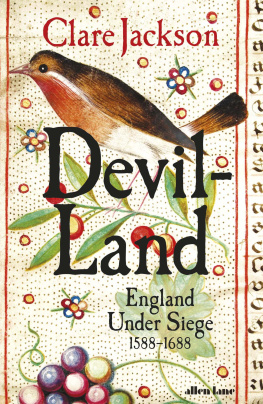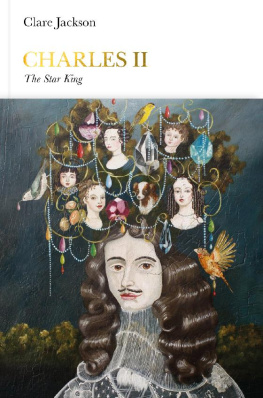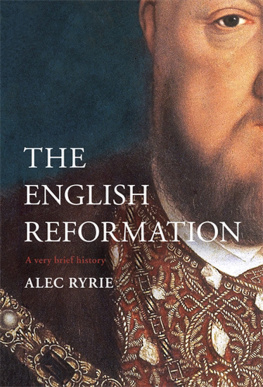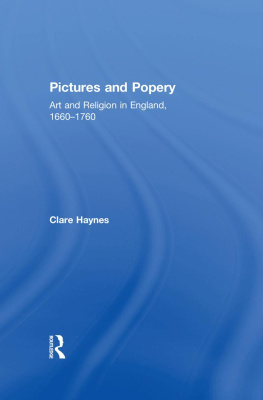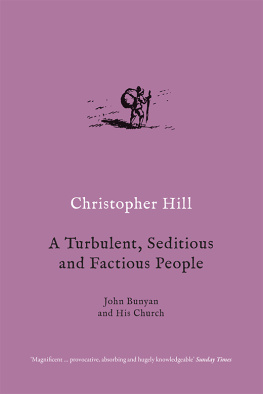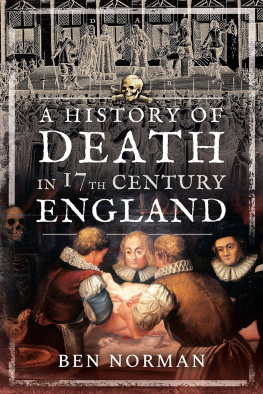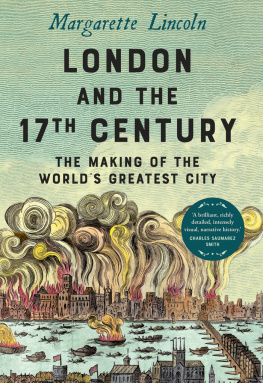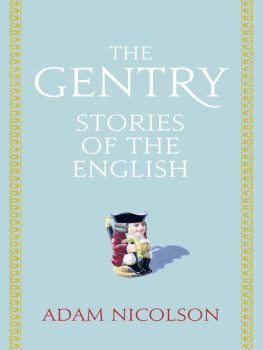About the Author
Clare Jackson is the Senior Tutor of Trinity Hall, Cambridge University. She has presented a number of highly successful programmes on the Stuart dynasty for the BBC and is the author of Charles II in the Penguin Monarchs series.
Acknowledgements
By coincidence, Devil-Land was commissioned by Penguin in the week that followed the referendum held on 23 June 2016 in which a majority of the United Kingdoms electorate voted to leave the European Union and was completed in the week after the UKs final departure from the EU, following the expiry of the transition period on 31 December 2020. Written in the shadow of Brexit speculation and debate, Devil-Lands focus on the contingent mutability of seventeenth-century Englands relations with its Continental neighbours provides perspective, if scant comfort, for its readers.
Devil-Lands inspiration was, however, sparked by five television films I made for BBC Scotland in two series entitled The Stuarts (2014) and The Stuarts in Exile (2015). Seeds for the books argument were sown while reappraising the impact of Stuart rule in locations ranging from a windswept Aberdeenshire beach that once hosted an invading Jacobite force, to Derrys city walls, Bredas cobbled streets, Madrids monumental Plaza Mayor, Versailless Hall of Mirrors and the Vatican City tomb of the Jacobite Old Pretender. Working with a talented production team was a huge privilege and I remain indebted to Richard Downes, Clara Glynn, Neil MacDonald, Ross Leven, Colin Murray, Tim Neil and Andy Twaddle. Lively conversations with my former literary agent Peter Robinson helped those ideas to germinate into a book proposal into which was injected Simon Winders infectious enthusiasm at Penguin. Simons combination of gusto and patience has been invaluable, while Natasha Fairweather assumed the agents mantle on Peters retirement. I am grateful for the keen editorial eyes of Eva Hodgkin and Jane Robertson and was also delighted to be able to draw, once more, on Cecilia Mackays expertise with regard to Devil-Lands illustrations.
To let seventeenth-century contemporaries speak for themselves, Devil-Lands text eschews historiographical overlay, but the endnotes and select bibliography document the extensive corpus of illuminating scholarship on which it is based. I am especially indebted to the cohort of nineteenth- and early twentieth-century editors of state papers and diplomatic correspondence; the lives of these knowledgeable scholars, many of whom were women, lie dwarfed by their colossal publications. From 1908 onwards, for example, Allen B. Hinds published over twenty calendared volumes of manuscript material relating to seventeenth-century England, from repositories in Venice and northern Italy. Necessarily obliged to halt his research in 1940, Hinds poignantly acknowledged the deep regret I feel that those with whom I have been pleasantly associated for so many years in preparing these Calendars must now be reckoned among the enemies of my country.
In much lighter days, I am very grateful to Amy Blakeway, Susan Doran, Martin Dzelzainis, Paul Seaward and David Smith for commenting on draft chapters of Devil-Land. I am also indebted to Eoin Devlin and Gijs Rommelse for supplying copies of works during library closures; Tom Pert for sending an unpublished seminar paper and Isabelle McNeill for advice regarding French translations. I would like to have discussed Devil-Lands arguments with the late Jenny Wormald, with whom lunches were always convivial; the fifth chapters title is taken from an article by Jenny in the Journal of British Studies (1985). Colleagues with whom I wish there was simply more time to discuss history include John Baker, John Cairns, Paul Cavill, Steve Murdoch, David Parrott, Jane Partner, Pedro Ramos Pinto, Jan-Melissa Schramm and Richard Serjeantson. Especial thanks are owed to Tony Claydon whose biennial Bangor conferences on the Restoration are models of interdisciplinary insight, as well as facilitating summer holidays on Angleseys stunning west coast. I have also derived rich stimulus from Liberty Fund colloquia, enjoying eclectic conversations about the writings of Cervantes, Conrad, Dickens, Forster, Hayek, Hume, Oakeshott, Shakespeare, Smith, Swift and Toqueville, among others. On this front, I am especially grateful to Steve Davies, Christine Henderson, Catherine Marshall, Seamus Perry, Adam Tomkins, David Wootton and David Womersley. Among many stimulating supervision discussions in Cambridge, a particular debt is owed to current and recent PhD students including Alexander Campbell, Will Ferguson, Ian King, Alice ODriscoll, Elly Robson and Tom Tyson.
Cambridges bookshops, libraries and coffee-shops are catalysts of creativity and inspiration. Having long marvelled at the University Librarys phenomenal resources, I did not need its prolonged closure on account of the coronavirus pandemic to reinforce my deep appreciation. But Devil-Lands navigation of plague outbreaks, past and present, has provided precedents for a new world of fragmented community and social distancing. As Stephen Bradwells A Watch-Man for the Pest advised in 1625, if you stand to talk with another, be distant from him the space of two yards. But if you suspect the party to have the infection, let the space of four yards at the least part you. Devil-Land has been written while I have been Senior Tutor of Trinity Hall a College founded in 1350 in the immediate aftermath of the Black Death. For helping me to juggle College and University administration, teaching and research, I am indebted to my PA Julie Powley, the Tutorial Registrar Rosie Ince, and the dedicated Tutorial Office team. I am also grateful to Tim Harvey-Samuel, Glen Sharp and Daniel Tyler for supportive fortitude and encouragement as this book neared completion.
Years ago, I was struck by Hermione Lees description of Virginia Woolf continually asking herself why she so much wants to read, and wants to read so much. From childhood, Ive always craved time to read and I remain constantly inspired, diverted and sustained by authors creative imaginations. I am very grateful to my mother Margaret Storrie for keenly encouraging my early historical enthusiasms and infusing my interest in Englands past with a critical Scots perspective. For decades of camaraderie, company and counsel, I warmly thank Emma Harding, Patricia Glennie, Celia Joicey and Jo Lambert. With Susanna Mitchell I enjoyed what felt like a series of unbroken conversations over nearly thirty years, sustained by laughter, long lunches and art exhibitions; sadly, she did not live to see this books publication. I cherish Christopher Dandekers longstanding friendship, kindness and thoughtful sagacity, while Jane Clarke provides a model of vibrant energy and liberal hospitality. For providing welcome distraction, generous childcare and lively rapport, I owe much to Rachel Begbie, Carolyn Dunn, Carley Gibbens, Kelly Mawby, Zoe Oram, Laura Owen, Ania Pine, Beth Robinson and Sophie Song.
Finally, my greatest debt is to Mark Goldie and our son Julius. As well as commenting on drafts of Devil-Land and readily discussing finer points of Stuart detail, Mark has supplied unwavering encouragement, calm reassurance and immense practical support. Equally unstinting in his enthusiasm, Juliuss construction of an elaborate pulley-system for coffee deliveries to my study expedited Devil-Lands completion, alongside diversions to discuss cacti, current affairs and Norwich City performances at Carrow Road. Devil-Land is dedicated to Mark and Julius, with love, gratitude and admiration.
Authors Note
Dates in the text appear in Old Style as per the Julian calendar that was observed in the British Isles until 1752 and, until 1700, was ten days behind the Gregorian calendar that had been adopted in the majority of Continental European countries after its introduction by Pope Gregory XIII in 1582. Dates in the endnotes remain as they appeared in the original sources. For convenience, each new year is taken to begin on 1 January, although, in England until 1752, and in Scotland until 1600, it was usual to deem each new year as starting on 25 March at the Feast of the Annunciation.

